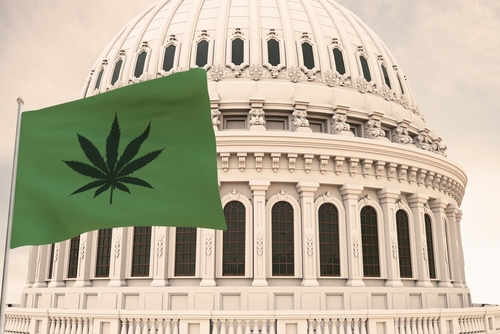[ad_1]
The Secure and Fair Enforcement (SAFE) Banking Act, legislation that would ensure cannabis businesses have access to banking services, was approved on Thursday by the U.S. House of Representatives after it was included as an amendment to the fiscal year 2023 National Defense Authorization Act (NDAA).

© Shutterstock
“Today marks the *7th time* the #SAFEBankingAct has passed the U.S. House,” tweeted U.S. Rep. Ed Perlmutter (D-CO), the original sponsor of the SAFE Banking Act, on Thursday. “I’m calling on the Senate to take action for the safety of our communities and success of Veteran- and minority-owned businesses across the country. It’s time to get this done.”
The SAFE Banking Act seeks to align federal and state law by prohibiting federal regulators from taking punitive measures against depository institutions that provide banking services to legitimate cannabis-related businesses. The bill establishes a safe harbor for any depository institution that chooses to provide banking services to a cannabis-related legitimate business that holds and maintains a license from a state or local government to engage in manufacturing, growing, or producing, as well as any business that handles, sells, transports, displays or distributes cannabis or cannabis products, according to a summary of the bill from Rep. Perlmutter’s office.
The House also passed the Veterans Equal Access Act as another amendment to the NDAA. That legislation directs the Department of Veterans Affairs (VA) to authorize VA health care providers to provide veterans with recommendations regarding participation in their state’s marijuana programs.
The approximately $840 billion House-passed NDAA bill, H.R. 7900, must still be reconciled with the Senate’s version of the legislation.
In a statement from Congressional Cannabis Caucus Co-Chairs Earl Blumenauer (D-OR), Barbara Lee (D-CA), Dave Joyce (R-OH) and Brian Mast (R-FL), the lawmakers said, “The need to establish a more rational approach to federal cannabis policy has never been greater,” noting that more than 91 percent of Americans live in states where adult use of cannabis is legal in some form.”
“From ensuring our veterans have equal access to state-legal medical marijuana programs to allowing dispensaries to utilize banking services, these amendments emphasize the opportunity for Congress to come together across party lines and make a crucial difference for communities impacted by the failed war on drugs,” the members of Congress said.
In a June 13 letter to congressional leaders, a group of financial organizations expressed support for the SAFE Banking Act being included as an amendment to the NDAA.
“The SAFE Banking Act puts in place necessary protections to bring revenue from state-sanctioned cannabis businesses into the financial services mainstream,” said the letter, which was signed by the CEOs of the American Bankers Association (ABA), the Credit Union National Association (CUNA), the Independent Community Bankers of America (ICBA) and the National Association of Federally-Insured Credit Unions.
“Legal cannabis businesses would no longer be forced to deal exclusively in cash, which makes them vulnerable to violent robbery and puts customers, employees, and the public at risk. The SAFE Banking Act will help keep our communities safe,” the letter said.
The financial associations said the legislation would also protect banks who may do business with those in the cannabis industry where marijuana for either medicinal or recreational uses is legal, even if it is illegal in their home state.
“We take no position on legalizing or decriminalizing medicinal or recreational cannabis at either the state or federal level,” the group said. “However, financial institutions operating in states where it is legal have business and individuals involved in the cannabis market who need access to traditional depository and lending services, the absence of which creates a significant public safety issue. Additionally, even those financial institutions that choose not to bank the cannabis industry risk unknowingly serving cannabis businesses in states where cannabis is legal. Indirect connections are often difficult to identify and avoid because, like any other industry, those offering cannabis-related services work with vendors and suppliers. Under current law, a financial institution that does business with any one of these indirectly affiliated entities could unknowingly violate federal law.”
To date, the U.S. House has now passed the SAFE Banking Act seven times. Voting has typically held along bipartisan lines. However, the bill has stalled each time in the Senate.
Perlmutter pushed for the SAFE Banking Act to be part of the NDAA last year. Although it was included in the House version of the bill, lawmakers in the Senate could not reach an agreement to include it as part of the final package.
[ad_2]
Source link





